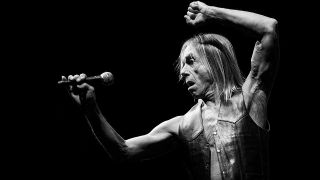Born James Newell Osterberg Jr on April 21, 1947, Iggy Pop first rose to infamy with The Stooges, the Detroit rockers with whom Pop recorded three seminal albums – 1969’s The Stooges, 1970’s Fun House and 1973’s Raw Power – that helped shape the sound and fury of punk rock. Ditching the flower-power and pretentions of their contemporaries, The Stooges dealt out brutal, filthy riffage topped off by the coiled-cobra snarl of their frontman, coining such classic tunes as 1969, I Wanna Be Your Dog, TV Eye and Search And Destroy.
With the Stooges, Pop took live performance to another level, famously smearing himself with peanut butter, rolling around in broken glass and – on what would prove their final gig before splitting in 1974 – provoking packs of Hell’s Angels to pelt him and his bandmates with beer bottles. This last show – a ramshackle performance available on the legendary bootleg Metallic KO – marked the cessation of Stooges activity for three decades; but while they’d sold few albums in their lifetime, their legend would only grow in their absence.
Having gone solo, however, Iggy swiftly became a star in his own right. He hooked up again with friend David Bowie, who had produced the final original Stooges album, and relocated to Europe, recording his first two solo albums – The Idiot and Lust For Life, both released 1977 – in France, Berlin and Munich. On these records he would coin some of his most famous tunes, songs like The Passenger, Nightclubbing, China Girl and Lust For Life, the mammoth anthem to hedonism that would later score the movie Trainspotting.
Solo Iggy enjoyed much more commercial success than his Stooges incarnation, but his wild onstage behaviour remained intact, humping a stuffed animal mid-song while appearing on 80s children’s TV show No. 73, and sporting an entirely transparent pair of trousers during a performance on 90s music programme The White Room showcasing his notoriously large member for the cameras. As later generations began to explore the roots of punk, Iggy’s credibility only increased, and the grunge era saw Iggy deliver 1993’s American Caesar album, acquainting himself with a new generation. But with age the Igster’s ambitions grew, and as the 20th Century ground to a close, he’d recast himself as a crooner on 1999 album Avenue B, produced by Don Was (of Was Not Was).
His influence formed punk rock, but also had a formative hand in shaping a large bulk of alternative music as we know it. Here, HIM guitarist Linde Lindstrom discusses the influence Iggy Pop had on his life and career.
“First time I saw Iggy live was during the American Caesar tour, so it must’ve been 1993, which means that I was 17. He played at Kulttuuritalo, Helsinki. I was just mesmerised by his presence. It was a very intense show. I’ve never seen Iggy do a bad show. He always puts himself out there completely. After the gig, I got really drunk with my friends and we went to our practice place and jammed the song Wild America for hours and trashed a few guitars…
“There is no one like Iggy out there. His message goes deeper than just music. It’s about attitude as well. He has the ability to write about things in a way that really touches me. I also love his sense of humour.
“There are loads of great interviews with Iggy on YouTube. I have had many Iggy marathons with my friends, just watching show after show. I’ve done that for two days in a row a few times. Some of my friends thought that I needed help.
- TeamRock+ Membership is now £2.99/$3.99!
- Buyer's Guide: How to buy the best of Iggy Pop
- Post-Pop progression: What's next for Iggy Pop?
- Cult Heroes: The Stooges - the chaotic tale of America's first punk band
“That said, I don’t think you can really hear Iggy in my playing very clearly; it’s more a state of mind.
“If you’re interested in checking out Iggy’s music, these are some more obscure songs from his solo career that you might not have heard, but really should: Blood On Your Cool, Inferiority Complex, Mask, Pussywalk, V.I.P., Nazi Girlfriend, Social Life, Innocent World, Til Wrong Feels Right, Whatever, Superbabe, My Idea Of Fun, Greedy Awful People, Español, I’m A Conservative, Shoeshine Girl, Little Electric Chair, I’m Bored, She Took My Money and Drink New Blood.
“I first met Iggy in Germany years ago. It was the Comet awards where he was presenting an award that we won! We got to meet him backstage and I had a huge pile of records and stuff for him to sign. I was so nervous that I couldn’t say a word. I was just sweating and trying not to faint…”
Check out Linde’s essential Iggy Pop playlist below…

